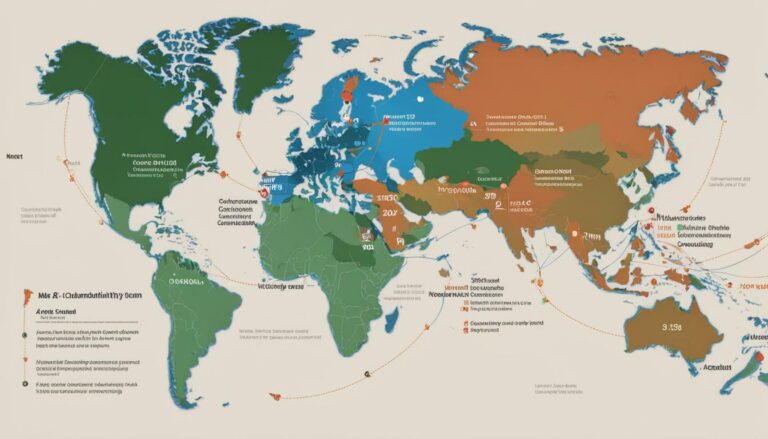Guide: How to Immigrate to Sweden Under the Skilled Professional Category
Are you considering immigrating to Sweden under the skilled professional category? This comprehensive guide will walk you through the entire process, from eligibility requirements to the application process.
Key Takeaways:
- Obtaining a work permit is necessary to work and reside in Sweden.
- There are different types of Sweden work visas, including employer-sponsored work permits, intra-company transfer permits, business visas, self-employment visas, working holiday visas, and EU Blue Cards.
- Employers must secure work permits for their foreign employees and fulfill certain conditions.
- The application process for a work permit takes about one to three months, and the fees range from $170 to $227.
- The process of immigrating to Sweden involves various steps, including job hunting and securing a work or residence permit.
- Knowing the Swedish language is not always necessary, particularly in the IT industry.
- Other important aspects to consider include finding an apartment, learning and adapting to Swedish culture, understanding the cost of living, navigating the healthcare system, and securing essential documentation.
Sweden Immigration Criteria for Skilled Professionals
Before you begin the immigration process, it’s essential to understand the criteria and requirements that skilled professionals must meet to be eligible for immigration to Sweden. The Swedish government has specific guidelines in place to ensure that only qualified individuals are granted work permits and residence permits.
The main requirements for skilled professionals immigrating to Sweden include:
- Having a valid passport
- Having a job offer with terms equivalent to Swedish collective agreements or standard
- Providing proof of accommodation
- Having health insurance, life insurance, and social security coverage
It’s important to note that the process of obtaining a work visa in Sweden begins with the employer. Employers are responsible for securing work permits for their foreign employees and fulfilling certain conditions, such as advertising the position, offering a minimum salary, and obtaining approval from the trade union.
| Visa Type | Processing Time | Fees |
|---|---|---|
| Work Permit | 1-3 months | $170 – $227 |
| Intra-Company Transfer Permit | 1-3 months | $170 – $227 |
| Business Visa | 1-3 months | $170 – $227 |
| Self-Employment Visa | 1-3 months | $170 – $227 |
| Working Holiday Visa | 1-3 months | $170 – $227 |
| EU Blue Card | 1-3 months | $170 – $227 |
Once you have received a job offer and met all the eligibility criteria, you can proceed with the application process for a work permit and residence permit card. It’s important to gather all the necessary documentation and submit a complete application to avoid any delays or complications.
Skilled Professional Immigration Process in Sweden
Once you meet the eligibility criteria, you can begin the immigration process, which involves several key steps to successfully immigrate to Sweden as a skilled professional. The following are the main steps you need to follow:
- Find a job offer: The first step is to secure a job offer from a Swedish employer. This is crucial as it serves as the basis for your work permit application. You can search for job opportunities through online job portals, networking, or contacting recruitment agencies.
- Obtain a work permit: With a job offer in hand, your employer will need to initiate the work permit application process. They will need to advertise the position, ensure it meets the minimum salary requirement, and obtain approval from the relevant trade union. Once approved, you can proceed with the work permit application.
- Submit the application: The work permit application is submitted to the Swedish Migration Agency either online or through a paper application. You will need to provide personal details, documentation supporting your qualifications and employment offer, and proof of financial stability.
- Pay the application fees: Along with your application, you will need to pay the required fees, which range from $170 to $227. These fees can be paid online or through a bank transfer.
- Wait for a decision: The processing time for a work permit application is typically one to three months. During this time, the Migration Agency will review your application and supporting documents. If approved, you will receive a work permit.
- Apply for a residence permit: Once you have the work permit, you can apply for a residence permit to legally reside in Sweden. This application is submitted to the Swedish Migration Agency and requires additional documentation, such as proof of accommodation and health insurance.
It is important to note that the immigration process may vary depending on your specific circumstances and the type of skilled professional category you fall under. It is advisable to consult with an immigration lawyer or expert to ensure you have a thorough understanding of the process and meet all requirements.
By following these steps and meeting the necessary criteria, you can navigate the skilled professional immigration process in Sweden and begin your journey towards a successful career and life in this beautiful Scandinavian country.
| Step | Description |
|---|---|
| 1 | Find a job offer |
| 2 | Obtain a work permit |
| 3 | Submit the application |
| 4 | Pay the application fees |
| 5 | Wait for a decision |
| 6 | Apply for a residence permit |
Understanding the Skilled Professional Category for Immigration to Sweden
The skilled professional category is designed to attract highly skilled individuals to Sweden, and understanding its requirements and qualifications is crucial for a successful immigration application. This category offers a pathway for professionals with specialized skills and expertise to contribute to the Swedish workforce and society.
To be eligible for the skilled professional category, applicants must meet specific qualifications:
- A recognized university degree or equivalent qualification in their field of expertise.
- A job offer from a Swedish employer that aligns with their qualifications.
- Evidence of relevant work experience in their field.
- Proficiency in the Swedish or English language.
- Sufficient funds to support themselves and any accompanying family members during their stay in Sweden.
It is important to note that the specific qualifications and requirements may vary depending on the profession and industry. Some professions may have additional criteria or licensing requirements that applicants need to fulfill.
Qualifications for Skilled Professionals Immigrating to Sweden:
| Qualification | Requirements |
|---|---|
| Recognized University Degree | Applicants must possess a recognized university degree or equivalent qualification in their field of expertise. |
| Job Offer | Applicants must have a job offer from a Swedish employer that aligns with their qualifications. The job offer should meet the requirements set by the Swedish Migration Agency. |
| Work Experience | Applicants must have relevant work experience in their field. The required duration of work experience may vary depending on the profession. |
| Language Proficiency | Applicants must demonstrate proficiency in the Swedish or English language, depending on the requirements of the specific profession. |
| Financial Resources | Applicants must have sufficient funds to support themselves and any accompanying family members during their stay in Sweden. The specific financial requirements may vary depending on family size. |
Understanding the skilled professional category for immigration to Sweden is essential for individuals seeking to pursue their career opportunities in the country. By meeting the qualifications and requirements, skilled professionals can embark on their immigration journey to Sweden and contribute to the growth and development of the Swedish economy.
Application Process for Skilled Professionals Immigrating to Sweden
Once you have determined your eligibility and are ready to apply, this section will guide you through the application process for skilled professionals immigrating to Sweden. The process can seem daunting, but with the right information and preparation, it can be a smooth and straightforward experience.
Step 1: Determine the correct visa type
Before applying, it is important to determine the correct visa type for your situation. The Skilled Professional Category is one option for skilled individuals looking to work and live in Sweden. This category is designed for professionals with specific qualifications and expertise in high-demand fields. Make sure to carefully review the eligibility requirements and ensure you meet all the criteria.
Step 2: Gather the required documents
Once you have determined the correct visa type, gather all the required documents for your application. This may include your passport, proof of accommodation, educational certificates, employment contract, and proof of health insurance. It is essential to provide all the necessary documentation to avoid any delays in the processing of your application.
Step 3: Submit your application
Once you have gathered all the required documents, submit your application to the Swedish Migration Agency. The application can be submitted online or through a paper form. Pay attention to the instructions and ensure that all information is filled out accurately. Any mistakes or missing information may lead to delays or even rejection of your application.
Step 4: Await the decision
After submitting your application, you will need to wait for the Swedish Migration Agency to process your application. The processing time can vary, but typically takes around one to three months. During this time, it is important to regularly check your email or online application portal for any updates or requests for additional information.
In conclusion, the application process for skilled professionals immigrating to Sweden involves determining the correct visa type, gathering the required documents, submitting your application, and awaiting the decision. It is important to be thorough and accurate in your application to ensure a smooth process. Remember to be patient and proactive in checking for updates on your application. Good luck with your immigration journey to Sweden!
Work Opportunities for Skilled Professionals in Sweden
Sweden offers abundant work opportunities for skilled professionals across a range of industries, making it an attractive destination for those seeking career advancement and growth. The country boasts a strong and diverse economy, with sectors such as technology, engineering, healthcare, finance, and manufacturing experiencing significant growth.
In the technology sector, Sweden is known for its innovative startups and world-leading companies, making it a hub for tech professionals. Stockholm, in particular, has a vibrant startup scene and is often referred to as the “unicorn factory” due to its high concentration of billion-dollar tech companies.
Engineering is another field that offers promising opportunities in Sweden. The country is home to numerous engineering and manufacturing companies, including global giants like Volvo, Ericsson, and ABB. Skilled engineers can find employment in various areas, such as automotive, telecommunications, renewable energy, and automation.
The healthcare industry in Sweden is also thriving, providing numerous job opportunities for skilled professionals. The country has a well-developed healthcare system and a high demand for medical practitioners, nurses, and other healthcare professionals. Additionally, Sweden has a strong focus on research and development in the healthcare sector, making it an attractive option for professionals looking to contribute to cutting-edge medical advancements.
| Industry | Key Opportunities |
|---|---|
| Technology | Startup ecosystem, opportunities in established tech companies |
| Engineering | Engineering companies, automotive, telecommunications, renewable energy |
| Healthcare | Medical practitioners, nurses, research and development |
| Finance | Banking, financial services, fintech |
| Manufacturing | Automotive, machinery, pharmaceuticals |
These are just a few examples of the many industries offering work opportunities for skilled professionals in Sweden. The country’s strong economy, high standard of living, and emphasis on innovation and research make it an ideal destination for professionals looking to advance their careers and enjoy a high quality of life.
Immigration Benefits for Skilled Professionals in Sweden
Moving to Sweden as a skilled professional not only offers excellent career prospects but also provides access to a wide range of benefits and services that enhance your quality of life.
One of the key benefits of immigrating to Sweden as a skilled professional is the generous social security system. Sweden has a well-established welfare state, offering comprehensive healthcare coverage, unemployment benefits, and pensions. As an immigrant, you and your family can enjoy access to these social services, ensuring peace of mind and financial stability.
In addition to the social security system, Sweden boasts an outstanding education system. As a skilled professional, you can take advantage of the high-quality education opportunities available for both you and your children. From renowned universities to exceptional schools, Sweden offers a range of educational options that can help you and your family thrive in your new home.
Furthermore, Sweden is known for its commitment to work-life balance and workplace equality. Skilled professionals in Sweden benefit from a progressive and inclusive work environment, with policies that promote work-life balance, parental leave, and gender equality. The country’s strong emphasis on equality ensures that all individuals, regardless of their background, have access to equal opportunities and fair treatment in the workplace.
Finding Accommodation in Sweden
Finding a place to live is an important step in your immigration journey to Sweden, and this section will guide you through the process of finding suitable accommodation. Whether you prefer to rent or buy, Sweden offers a range of housing options to suit different budgets and preferences. From apartments in bustling city centers to quaint cottages in the countryside, you’re sure to find a place that feels like home.
Rental Market
One popular option for newcomers is renting. The rental market in Sweden is well-regulated, ensuring fair and transparent processes. The most common type of rental agreement is called a “first-hand contract,” which provides long-term stability and tenant rights. However, it’s important to note that the demand for rental properties, especially in major cities like Stockholm and Gothenburg, can be high. Therefore, it’s advisable to start your search well in advance and consider expanding your options to surrounding areas.
| Website | Description |
|---|---|
| Bostad Direkt | A popular online platform where you can find rental listings from both private landlords and real estate agencies. It allows you to filter your search based on location, budget, and other preferences. |
| Blocket | A classifieds website that features a wide range of rental listings. It’s a go-to platform for many Swedes, and you can find everything from apartments and houses to rooms for rent. |
| Qasa | This online platform specializes in sublets and offers a safe and secure way to find temporary housing. It’s a great option if you’re looking for short-term accommodation while you settle in Sweden. |
Buying Property
If you’re considering more long-term plans, buying a property in Sweden can be a viable option. The Swedish real estate market has a wide selection of properties available, ranging from apartments and townhouses to detached houses and villas. It’s advisable to engage the services of a real estate agent who can guide you through the process and help you find the right property based on your preferences and budget.
When buying property in Sweden, it’s important to be aware of additional costs such as property transfer tax, stamp duty, and legal fees. It’s also recommended to have a thorough inspection of the property conducted to ensure there are no hidden issues.
With the right resources and a clear understanding of your housing needs, finding accommodation in Sweden can be a straightforward process. Take the time to research different areas, consider your budget, and explore various options to find the perfect place to call home in Sweden.
Adapting to Swedish Culture and Lifestyle
Immigrating to a new country involves adapting to a new culture and lifestyle, and this section will provide valuable information on how to navigate and embrace Swedish culture. Sweden is known for its high standard of living, social equality, and respect for nature. Understanding and embracing these values will help you integrate into Swedish society and make the most of your experience.
Swedish Customs and Etiquette
Swedes value punctuality, so it is important to be on time for appointments and social gatherings. In social settings, it is customary to greet people with a firm handshake and make direct eye contact. Swedes also appreciate personal space, so it is important to respect their need for privacy and avoid standing too close. Sweden is known for its egalitarian society, and gender equality is highly valued. It is common for both men and women to share household chores and parenting responsibilities.
Outdoor Lifestyle and Recreational Activities
Sweden’s natural beauty is one of its greatest assets, and Swedes love spending time outdoors. Exploring the countryside, hiking in national parks, and enjoying the scenic lakes and coastline are popular activities. Swedes also embrace the concept of “friluftsliv,” which translates to “open-air living.” This means spending time in nature and engaging in outdoor activities like camping, fishing, and skiing. Embracing this outdoor lifestyle will not only help you connect with nature but also provide opportunities to socialize and meet new people.
Swedish Cuisine
Swedish cuisine is diverse and reflects the country’s geographical diversity. Traditional Swedish dishes include meatballs, herring, gravlax (cured salmon), and crispbread. Swedes also have a tradition called “fika,” which is an essential part of Swedish culture. Fika involves taking a break, usually with coffee and pastries, and socializing with friends or colleagues. Embracing Swedish cuisine and participating in fika will help you immerse yourself in Swedish culture and connect with locals.
| Customs and Etiquette | Outdoor Lifestyle | Swedish Cuisine |
|---|---|---|
| Swedes value punctuality and personal space | Embrace the concept of “friluftsliv” and enjoy outdoor activities | Try traditional Swedish dishes and participate in fika |
| Respect gender equality and shared responsibilities | Explore the countryside and enjoy the natural beauty | Experience Swedish cuisine and connect with locals through fika |
| Make direct eye contact when greeting people | Engage in outdoor recreational activities | Sample local delicacies like gravlax and crispbread |
By embracing Swedish culture and lifestyle, you will not only adapt to your new surroundings but also enhance your overall experience in Sweden. Whether it’s respecting customs and etiquette, appreciating the outdoor lifestyle, or savoring Swedish cuisine, immersing yourself in the local culture will help you feel at home in Sweden.
Understanding the Cost of Living in Sweden
Before you make the move to Sweden, it’s important to have a clear understanding of the cost of living in the country to ensure you can budget and plan accordingly.
Sweden is known for its high standard of living, but with that comes a higher cost of living compared to many other countries. The prices of goods and services in Sweden can be quite steep, especially in major cities like Stockholm and Gothenburg. To give you an idea, here is a breakdown of some common expenses you can expect to encounter:
| Expense | Average Cost |
|---|---|
| Accommodation (monthly rent) | $850 to $1,500+ |
| Food (groceries) | $250 to $400 |
| Public Transportation (monthly pass) | $100 to $130 |
| Restaurant Dinner for Two | $50 to $100 |
| Utilities (electricity, heating, water) | $100 to $200 |
These are just rough estimates and can vary depending on your location and lifestyle. It’s worth noting that Sweden has a high tax rate, which contributes to the overall cost of living. However, the quality of life, social benefits, and public services in Sweden are also among the best in the world.
If you’re planning to move to Sweden, it’s advisable to create a detailed budget that takes into account all your expenses, including rent, groceries, transportation, healthcare, and leisure activities. This will help you better manage your finances and ensure you can comfortably afford your new life in Sweden.
Navigating the Healthcare System in Sweden
Understanding how the healthcare system works in Sweden is essential for your well-being and peace of mind, and this section will guide you through the process. Sweden has a highly regarded healthcare system, providing comprehensive and accessible medical care to its residents. Whether you are a skilled professional who has recently immigrated to Sweden or planning to do so, it is important to familiarize yourself with the healthcare system to ensure you receive the appropriate care when needed.
The Swedish healthcare system operates on the principle of universal healthcare, meaning that all residents have equal access to medical services, regardless of their income or employment status. The system is primarily funded through taxes and is governed by the National Board of Health and Welfare. The healthcare services are divided into two main categories: primary care and specialized care.
Primary care in Sweden is provided by general practitioners, known as “vardcentral.” They act as the first point of contact for non-emergency medical issues and can provide a wide range of services, including general check-ups, vaccinations, prescriptions, and referrals to specialists if necessary. It is important to register with a vardcentral to ensure continuity of care and access to primary healthcare services.
In addition to primary care, Sweden also offers specialized healthcare services, known as “specialistvård.” These services are provided by hospitals and specialized clinics and are designed to address more complex medical conditions or procedures. Access to specialized care typically requires a referral from a general practitioner or primary care physician.
To navigate the healthcare system effectively, it is recommended to obtain comprehensive health insurance coverage. While Sweden provides healthcare services to all residents, having private health insurance can offer additional benefits, such as shorter waiting times for specialized care or access to private clinics. It is worth noting that healthcare costs in Sweden can be high, especially for non-emergency services or elective procedures, so having adequate insurance coverage can help mitigate these expenses.
| Key Points: |
|---|
| – Sweden has a universal healthcare system, providing equal access to medical services for all residents. |
| – Primary care is provided by general practitioners known as “vardcentral,” while specialized care is offered by hospitals and clinics. |
| – Registering with a vardcentral is recommended for access to primary care services. |
| – Obtaining comprehensive health insurance coverage can provide added benefits and help manage healthcare costs. |
Conclusion
In conclusion, immigrating to Sweden under the skilled professional category requires careful planning and adherence to the immigration criteria and application process. Securing a work permit or residence permit is essential for non-EU/EEA citizens, and the employer plays a crucial role in this process. It is important to gather all the necessary documentation, including proof of accommodation and details of health insurance and social security.
Job hunting in Sweden can be an exciting opportunity, and knowledge of the Swedish language is not always a prerequisite, especially in industries such as IT. Once the suitable visa type is determined, the next step is to apply for the visa and residence permit card, which can take up to several months. Additionally, finding suitable accommodation, adapting to Swedish culture and lifestyle, understanding the cost of living, and navigating the healthcare system are all important aspects to consider for a successful transition to life in Sweden.
It’s important to note that the information provided in this guide is general in nature, and it’s always recommended to consult with the Swedish Migration Agency or seek professional advice for specific immigration inquiries. Sweden offers attractive work opportunities, a high standard of living, and a welcoming environment for skilled professionals looking to make Sweden their new home.
FAQ
Q: What types of work visas are available for immigrating to Sweden?
A: There are various types of work visas available, including employer-sponsored work permits, intra-company transfer permits, business visas, self-employment visas, working holiday visas, and EU Blue Cards.
Q: What are the general requirements for a Sweden work visa?
A: The general requirements include a valid passport, proof of accommodation, a job offer with terms equal to Swedish collective agreements or standard, and details of health insurance, life insurance, and social security.
Q: How long does the work permit application process take?
A: The application process for a work permit in Sweden takes about one to three months.
Q: What is the fee for a work permit application?
A: The fees for a work permit application range from $170 to $227.
Q: Do I need to know Swedish language to find work in Sweden?
A: Knowing Swedish language is not always necessary, particularly in the IT industry.
Q: What are the steps involved in immigrating to Sweden as a skilled professional?
A: The steps involve finding a job, applying for a visa and residence permit card, finding accommodation, adapting to Swedish culture, understanding the cost of living, navigating the healthcare system, and securing essential documentation.
Q: What are the work opportunities for skilled professionals in Sweden?
A: Skilled professionals have a range of work opportunities in various industries and sectors in Sweden.
Q: What benefits can skilled professionals enjoy as immigrants in Sweden?
A: Skilled professionals in Sweden can enjoy benefits such as healthcare, education, and social security.
Q: How can I find suitable accommodation in Sweden?
A: There are various resources and websites available to help you find suitable accommodation in Sweden.
Q: How can I adapt to Swedish culture and lifestyle?
A: Adapting to Swedish culture and lifestyle involves learning about Swedish customs, traditions, and social norms, and actively participating in the local community.
Q: What is the cost of living in Sweden?
A: The cost of living in Sweden includes expenses related to housing, transportation, healthcare, and daily essentials.
Q: How does the healthcare system work in Sweden?
A: The healthcare system in Sweden provides universal healthcare coverage, and it is important to have health insurance to access healthcare services.
Source Links
- https://karenroldan.net/how-to-move-to-sweden/
- https://www.usemultiplier.com/sweden/work-permit
- https://www.migrationsverket.se/English/Private-individuals/Working-in-Sweden/Look-for-work-or-start-a-business.html







